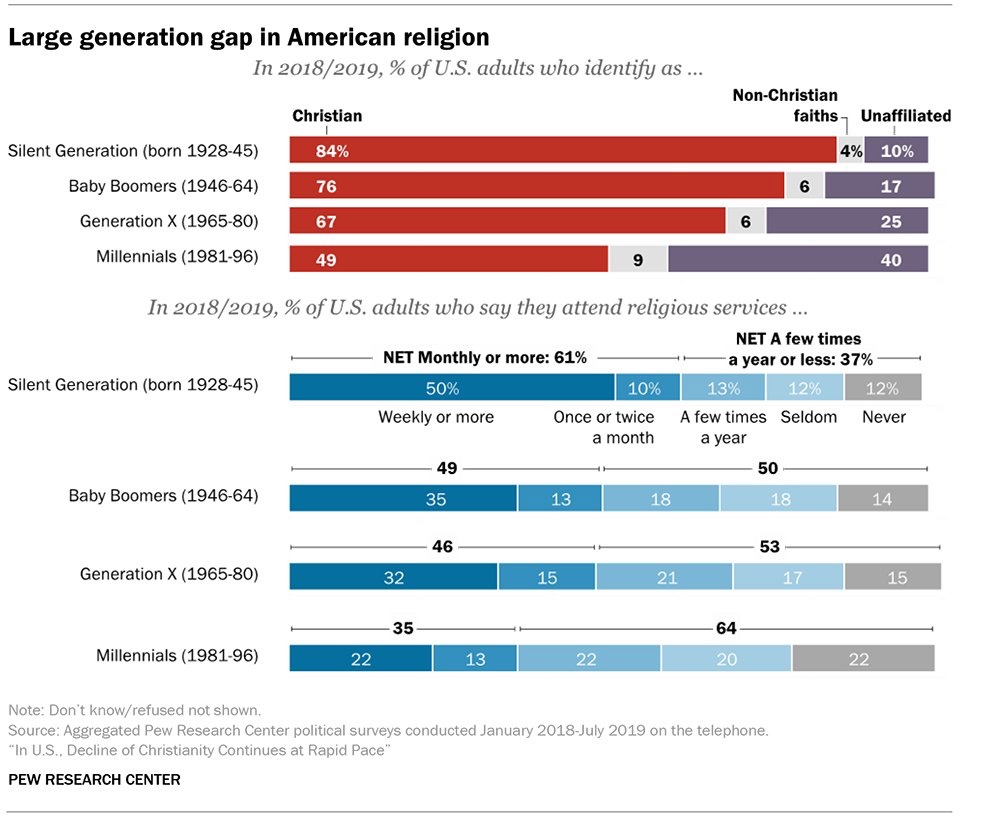The United States is steadily becoming less Christian and the number of people with no religion is rising.
Those are the twin headlines from the latest Pew Research report released Thursday, which shows a dramatic decline in American religious habits over the course of a decade.
The report, an aggregation of yearly political surveys that ask about religion, shows rapid changes in generational attitudes toward religion.
It finds that two-thirds (65 per cent) of Americans describe themselves as Christians, down from 77 per cent in 2009. It also shows that the number of Americans who say they have no religion – sometimes called nones – has risen to 26 per cent, up from 17 per cent a decade ago.
“The rate at which Christians are declining is very striking,” said Greg Smith, associate director of research at Pew. “And the share of Americans who have no religion is growing very rapidly, which is just as striking.”
Protestants now make up less than half of all US adults – or 43 per cent (down from 51 per cent a decade ago) and Catholics make up 20 per cent (down from 23 per cent in 2009).
Those figures are reflected in attendance at religious services as well. For the first time, more Americans say they attend religious services a few times a year or less (54 per cent) than those who attend at least once a month (45 per cent). The study notes that while overall church attendance is down, 62 per cent of Christians say they attend services once a month or more – about the same as a decade ago.
“It’s quite shocking,” said Scott Thumma, a sociologist of religion at Hartford Seminary. “This rapid shift is about generational replacement. The most religious folks are the ones who are dying and the least religious folks are the ones coming in.”

To put it most graphically, 84 per cent of the Silent Generation (born between 1928 and 1945) identify as Christian, compared with 49 per cent of the Millennial Generation (born between 1981 and 1996).
Thumma pointed to a number of cultural reasons that may be speeding up the generational shift, including less social pressure to go to church; the clergy sexual abuse scandal, especially in the Catholic Church; and shifting attitudes toward sexuality and gender that clash with traditional Christian teachings.
Smith, the Pew researcher, said a dissatisfaction with conservative political ties to evangelical Christianity may also be fueling the growth of the nones.
“We know religious nones are among the most strongly and consistently Democratic and politically liberal groups in the population,” he said. “We know that in the 2016 election, 68 per cent of nones voted for Hillary Clinton over Donald Trump. We also saw that two-thirds of religiously unaffiliated voters identify with or lean toward the Democratic Party.”
Hemant Mehta, the popular blogger behind the Friendly Atheist, said it’s not that the nones are embracing atheism necessarily. Instead, they may be rebelling against the link between conservative religion and politics.
“They had plenty of opportunity to take the ethical route: Do the nice, kind, decent thing,” Mehta said. “What do the most powerful voices do? They cover up sexual abuse. They became allies with Donald Trump. When you see what they’re doing and who they’re hanging out with, why would anyone want to be part of that club?”
The report also showed a slower decline among black and Hispanic Americans. Both groups are more likely to describe themselves as Christians and to attend religious services. Among African-Americans, 58% say they attend church more than once a month (compared to 42 per cent of whites) and 51 per cent of Hispanics said the same.
Other trends documented in the new survey:
• Catholics are no longer a majority of the US Hispanic population. Only 47 per cent of Hispanics identify as Catholic, down from 57 per cent a decade ago. And more Hispanics are religiously unaffiliated – about 23 per cent.
• Women are still more religious than men, but less so. The share of women with no religion has risen by 10 percentage points, similar to the increase among men.
• Nones make up one-third of Democrats. But they are growing in Republican circles as well. About 16 per cent of Republicans identify as nones, up from 10 per cent in 2009.
• White evangelicals are declining and now constitute about 16 per cent of the US population, down from 19 per cent a decade ago.
The report is based on annual political surveys taken over the phone with a sample size of 12,000 to 25,000 people each. The margin of error for the full sample was between 0.7 and 1 percentage point.






